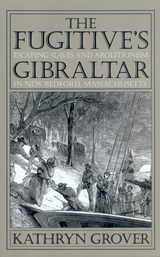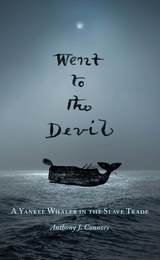3 books about New Bedford

The Fugitive’s Gibraltar
Escaping Slaves and Abolitionism in New Bedford, Massachusetts
Kathryn Grover
University of Massachusetts Press, 2009
We are currently updating our website and have not yet posted complete information for this title. Many of our books are in the Google preview program, which allows readers to view up to 20% of the book. If this title is active in the program, you will find the Google Preview button in the sidebar below.
[more]

Shallow Graves
The Hunt for the New Bedford Highway Serial Killer
Maureen Boyle
University Press of New England, 2017
Eleven women went missing over the spring and summer of 1988 in New Bedford, Massachusetts, an old fishing port known as the Whaling City, where Moby Dick, Frederick Douglass, textile mills, and heroin-dealing represent just a few of the many threads in the community’s diverse fabric. In Shallow Graves, investigative reporter Maureen Boyle tells the story of a case that has haunted New England for thirty years. The Crimes: The skeletal remains of nine of the women, aged nineteen to thirty-six, were discovered near highways around New Bedford. Some had clearly been strangled, others were so badly decomposed that police were left to guess how they had died. The Victims: All the missing women had led troubled lives of drug addiction, prostitution, and domestic violence, including Nancy Paiva, whose sister was a hard-working employee of the City of New Bedford, and Debra Greenlaw DeMello, who came from a solidly middle-class family but fell into drugs and abusive relationships. In a bizarre twist, Paiva’s clothes were found near DeMello’s body. The Investigators: Massachusetts state troopers Maryann Dill and Jose Gonsalves were the two constants in a complex cast of city, county, and state cops and prosecutors. They knew the victims, the suspects, and the drug-and-crime-riddled streets of New Bedford. They were present at the beginning of the case and they stayed to the bitter end. The Suspects: Kenneth Ponte, a New Bedford attorney and deputy sheriff with an appetite for drugs and prostitutes, landed in the investigative crosshairs from the start. He was indicted by a grand jury in the murder of one of the victims, but those charges were later dropped. Anthony DeGrazia was a loner who appeared to fit the classic serial-killer profile: horrific childhood abuse, charming, charismatic, but prone to bursts of violence. He hunted prostitutes in the city by night and served at a Catholic church by day. Which of these two was the real killer? Or was it someone else entirely? Maureen Boyle first broke the story in 1988 and stayed with it for decades. In Shallow Graves she spins a riveting narrative about the crimes, the victims, the hunt for the killers, and the search for justice, all played out against the backdrop of an increasingly impoverished community beset by drugs and crime. Drawing on more than one hundred interviews, along with police reports, first-person accounts, and field reporting both during the killings and more recently, Shallow Graves brings the reader behind the scenes of the investigation, onto the streets of the city, and into the homes of the families still hoping for answers.
[more]

Went to the Devil
A Yankee Whaler in the Slave Trade
Anthony J. Connors
University of Massachusetts Press, 2019
Edward Davoll was a respected New Bedford whaling captain in an industry at its peak in the 1850s. But mid-career, disillusioned with whaling, desperately lonely at sea, and experiencing financial problems, he turned to the slave trade, with disastrous results. Why would a man of good reputation, in a city known for its racial tolerance and Quaker-inspired abolitionism, risk engagement with this morally repugnant industry?
In this riveting biography, Anthony J. Connors explores this question by detailing not only the troubled, adventurous life of this man but also the turbulent times in which he lived. Set in an era of social and political fragmentation and impending civil war, when changes in maritime law and the economics of whaling emboldened slaving agents to target captains and their vessels for the illicit trade, Davoll's story reveals the deadly combination of greed and racial antipathy that encouraged otherwise principled Americans to participate in the African slave trade.
In this riveting biography, Anthony J. Connors explores this question by detailing not only the troubled, adventurous life of this man but also the turbulent times in which he lived. Set in an era of social and political fragmentation and impending civil war, when changes in maritime law and the economics of whaling emboldened slaving agents to target captains and their vessels for the illicit trade, Davoll's story reveals the deadly combination of greed and racial antipathy that encouraged otherwise principled Americans to participate in the African slave trade.
[more]
READERS
Browse our collection.
PUBLISHERS
See BiblioVault's publisher services.
STUDENT SERVICES
Files for college accessibility offices.
UChicago Accessibility Resources
home | accessibility | search | about | contact us
BiblioVault ® 2001 - 2024
The University of Chicago Press









